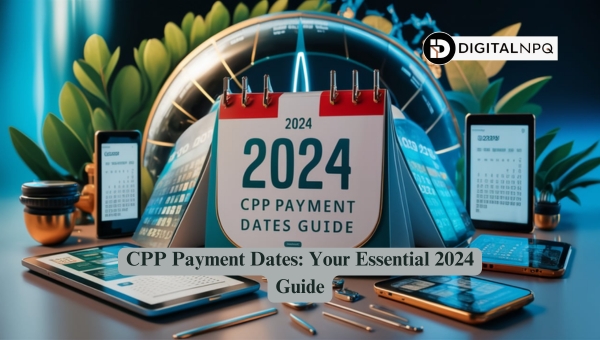CPP Payment Dates: Your Essential 2024 Guide

The Canada Pension Plan (CPP) can feel overwhelming, but understanding CPP payment dates is crucial for financial planning. In this article, we’ll cover everything you need to know. From the monthly payment schedule for 2024 to eligibility criteria and how to manage your payments.
This guide is designed to help you make informed decisions and ensure you never miss a payment. Whether you’re about to retire or are already receiving benefits, this comprehensive resource will keep you informed and prepared. Let’s dive in and simplify the process together.
About The Canada Pension Plan (CPP)
The Canada Pension Plan (CPP) is a national social insurance program established in 1966. It provides retirement, disability, and survivor benefits to Canadians.

Funded through mandatory contributions from employees, employers, and self-employed individuals, the CPP ensures that working Canadians contribute towards their future financial stability.
The importance of CPP lies in its role in alleviating poverty among seniors, offering a reliable income source during retirement. Therefore, understanding CPP is essential for anyone planning their financial future in Canada.
CPP Payment Dates For 2024
Staying informed about CPP payment dates is essential for managing your finances effectively. In this section, we’ll cover the monthly payment schedule and highlight important deadlines to keep in mind for the year 2024.

Monthly Payment Schedule
For 2024, the Canada Pension Plan (CPP) payments are scheduled as follows:
| Month | Payment Date |
|---|---|
| January | January 29, 2024 |
| February | February 27, 2024 |
| March | March 26, 2024 |
| April | April 26, 2024 |
| May | May 29, 2024 |
| June | June 26, 2024 |
| July | July 29, 2024 |
| August | August 28, 2024 |
| September | September 25, 2024 |
| October | October 29, 2024 |
| November | November 27, 2024 |
| December | December 20, 2024 |
These dates ensure that recipients receive their benefits consistently each month. It’s important to mark these dates on your calendar to stay on top of your finances.
Important Deadlines
Recipients of CPP benefits should be aware of several crucial deadlines:
- Application Deadlines: Submit applications for CPP benefits as early as possible, ideally at least four months before the intended start date, to avoid payment delays.
- Tax Considerations: Remember, CPP payments are taxable. Ensure that you adjust your tax withholdings accordingly to avoid surprises during tax season.
By keeping these deadlines in mind, you can ensure that your CPP benefits are managed effectively and without interruption.
Also Read: Verizon Class Action Settlement: Claim Your Share Now!
Eligibility For CPP Benefits
Understanding who qualifies for CPP benefits is essential for anyone planning their retirement in Canada. Let’s explore the eligibility criteria and what it takes to receive these benefits.

Qualification Criteria
To qualify for CPP benefits, individuals must meet several important criteria:
- Age: Applicants must be at least 60 years old to start receiving retirement benefits. Opting to receive benefits early will result in a reduced monthly amount.
- Contributions: A minimum of one valid contribution to the CPP is required. Contributions are made through deductions from employment income, ensuring that all working Canadians are part of the system.
- Residency: Applicants must be legal residents of Canada. Additionally, they need to have contributed to the CPP for a minimum period, typically at least 10 years.
By fulfilling these criteria, individuals can secure their eligibility for CPP benefits, providing financial support during their retirement years.
How To Apply For CPP Benefits?
Navigating the application process for Canada Pension Plan (CPP) benefits can seem overwhelming, but with the right guidance, it’s quite manageable. Below, we’ll delve into the essential documentation you’ll need and the steps to follow to ensure a smooth application process.
Necessary Documentation
To apply for CPP benefits, you must have certain documents ready. These documents help verify your identity and ensure that your application is processed without issues. Here’s what you’ll need:
- Proof of Identity: This can be a birth certificate, passport, or any government-issued ID.
- Social Insurance Number (SIN): This is crucial for verifying your contributions and eligibility.
- Banking Information: You’ll need this to set up direct deposits for your payments.
- Contribution History: Information about your previous contributions to the CPP, which you can access through your My Service Canada Account.
Having these documents prepared in advance can significantly speed up the application process.
Application Process
Applying for CPP benefits involves several specific steps. Here’s a straightforward guide to help you through the process:
- Visit the Official Website: Go to the Government of Canada’s official website for CPP.
- Choose Application Method: Decide whether you want to apply online through your My Service Canada Account or download a paper application.
- Complete the Application: Fill out the necessary forms with accurate personal information.
- Submit the Application: Submit your completed application either online or by mailing it to the appropriate address.
- Await Confirmation: It can take up to 120 days to receive a determination regarding your benefits.
Following these steps carefully will help ensure that your application is processed smoothly and efficiently.
Also Read: Capital One Settlement: All You Need to Know
Managing Your CPP Payments
Handling your CPP payments efficiently is crucial for a smooth experience. We’ll guide you through setting up direct deposits and ensuring you receive your payments on time, addressing common issues that might arise.
Direct Deposit Information
Setting up direct deposit for your CPP payments ensures that you receive your funds safely and promptly. Here’s how you can do it:
- Online Setup: Visit the My Service Canada Account (MSCA) website.
- Login: If you don’t have an account, you will need to create one.
- Banking Information: Provide your bank account details, including the institution number, transit number, and account number.
Direct deposit is the most secure and efficient way to receive your payments, eliminating the risk of lost or delayed cheques.
Ensuring Timely Payments
To make sure you receive your CPP payments without delay, consider these tips:
- Check Payment Dates: Be aware of the monthly payment schedule to know when to expect your funds.
- Keep Info Updated: Ensure your personal and banking information is current in your My Service Canada Account.
- Report Issues Immediately: If there are any delays, contact Service Canada promptly to resolve them.
By following these steps, you can manage your CPP payments effectively, avoiding common pitfalls and ensuring a hassle-free experience.
Financial Implications Of CPP Payments
When navigating the realm of CPP payments, it’s crucial to understand the financial implications that come with it. This section will delve into key considerations regarding taxes and recent enhancements to the program that could impact your retirement planning.
Tax Considerations
Receiving CPP payments does have tax implications. Here are some important points to note:
- Taxable Income: CPP payments are considered taxable income by the Canada Revenue Agency (CRA). This means you must report these payments on your annual tax return.
- Tax Deductions: You can request that taxes be deducted from your CPP payments. This can help manage your tax liability throughout the year, rather than facing a large tax bill at the end.
- Impact on Other Benefits: Since CPP payments add to your total income, they may affect other income-tested benefits, such as the Old Age Security (OAS) pension or the Guaranteed Income Supplement (GIS).
CPP Enhancements
Recent enhancements to the CPP program are designed to provide better retirement benefits. Here are some noteworthy changes:
- Increased Contribution Rates: Contribution rates have been gradually increasing. These higher rates mean that future retirees can expect to receive larger monthly benefits.
- Post-Retirement Benefits: Even if you’re already receiving CPP payments, continuing to work and contribute can increase your benefits through the Post-Retirement Benefit (PRB).
- Adjustments for Inflation: CPP payments are adjusted annually to reflect changes in the cost of living. This helps maintain the purchasing power of your benefits over time.
- Enhanced Benefits for Low-Income Workers: The CPP enhancement includes provisions to increase benefits for low-income workers, ensuring greater financial security in retirement.
Understanding these financial implications can help you better plan for your retirement and manage your CPP payments effectively.
FAQs
How can I set up direct deposit for my CPP payments?
You can set up direct deposit through your My Service Canada Account, ensuring your payments are deposited directly into your bank account.
Are CPP payments taxable?
Yes, CPP payments are considered taxable income, and you may need to adjust your tax withholdings accordingly.
What are the recent enhancements to the CPP?
Recent enhancements include increased contribution rates and periodic adjustments to the payments to account for inflation, aiming to provide higher benefits in the future.
Conclusion
In summary, understanding CPP payment dates is crucial for ensuring timely and accurate receipt of benefits. By staying informed about monthly schedules, important deadlines, and eligibility requirements, you can better manage your CPP payments and make informed decisions about your retirement planning.
Additionally, being aware of how to apply and manage your payments can help you avoid common pitfalls and ensure financial stability during retirement. To delve deeper into related topics and enhance your financial knowledge, explore more informative articles on our site!
